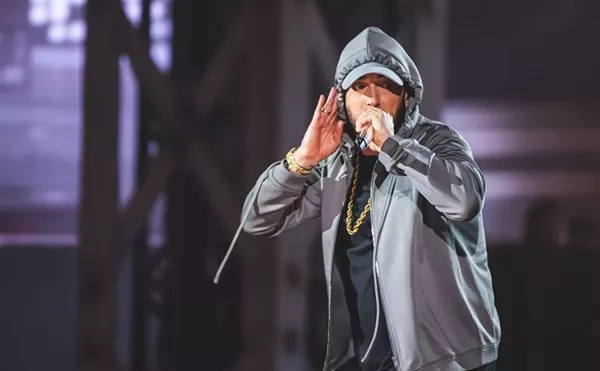Giddy young girls in pin curls and boys with reined-in hormones wait in this Oklahoma City auditorium on a Friday night in 1959. It’s the age of the virgin, at least for appearance’s sake, and by all auspices this room is packed with them. They’re patient and polite.
Then Wanda Jackson takes the stage, and the facade is shattered.
With ruby-red lips, bouffant raven hair, spaghetti straps and a figure-hugging pencil skirt, the dazzling sylph hangs a jumbo six-string guitar from her neck, shoots a coy smile at the audience, strums a hot E-chord and growls. Some people like to rock!/Some people like to roll!/Let’s have a party/Hoooo!/Let’s have a party!
Her hips shake. Her high heels shuffle furiously.
And, as with much of the “demon” rock of the time, it touches something in these seemingly vestal kids. They go wild.
“I was a renegade and a rebel,” Jackson says by telephone from her Oklahoma home. “My record company didn’t know what to do with me.”
At 14, Jackson began her career as a country singer. After being discovered by honky-tonk legend Hank Thompson and signing with Decca Records, the young musician found herself on a runaway career train that showed no signs of ever slowing down. By the time she graduated from high school, Jackson found herself on tour with the King himself, Elvis Presley. It was on this trip that the gravel-voiced singer would be encouraged to take a stab at rockabilly music — and commence a relationship with Elvis, her very first boyfriend.
“It was just so new,” Jackson says of rock ’n’ roll. Popular music’s icons were changing from sweater-clad crooners to sexy greasers and, as far as Jackson is concerned, the controversial transition came from perfectly wholesome places. To hear her say it, it was just time to happen.
“This was what we wanted to hear, and we were going to listen to it,” she says. “Really, if you think about it, this is the first time kids rebelled in America.”
Compared to today’s standards, it seems absurd that an exposed knee and some red lipstick could be considered rebellious, but it was. Jackson endured the era’s prejudices and puritanical hypocrisies. She admits that much of her professional courage came from being around Presley.
“He was a wonderful person,” she says. “He was fun-loving and generous with himself; he’s the one who encouraged me. Sometimes I feel like he knew something I didn’t. He must have known my spirit.”
Though showbiz hoopla eventually broke the two singers apart, Jackson went on to become one of the most beloved female pop singers of all time.
After scoring commercial success with “Let’s Have a Party” in 1959, Jackson began to write her own songs: “Hot Dog! That Made Him Mad,” “Mean Mean Man” and “Fujiyama Mama” all hit the charts.
But Jackson, a woman who has been called everything from the first riot grrl to the Queen of Rockabilly, doesn’t agree that she was (or needed to be) a feminist.
“I was always with men, five or six artists in my band, and they just always accepted me as their peer,” she says. “I never got the feeling I was different. I was just doing what I wanted to do. I never had to bend to be like the other girls.” Jackson simply assumed that she was an equal.
In 1961, in the midst of her rock ’n’ roll heyday, Jackson met and married IBM computer programmer Wendall Goodman. “He was in a promising business,” Jackson says. “This was back when computers took up a whole room, honey.”
Jackson says she struggled with the demands of her job and her relationship. “We didn’t get married to be apart,” she says. “I said to my husband, ‘I am going to leave this whole career thing up to you. I’ll give it up.’” Instead, Goodman quit his job to go on the road with his wife.
When the British Invasion struck hard in the mid-’60s, Jackson’s rockabilly popularity began to wane. That, coupled with rumored problems with alcohol and a failing marriage, put the brakes on her career. Jackson says she and her husband discovered that the one thing missing in their life was God.
“It saved my marriage,” she says. Shortly after rediscovering God, the singer got involved in gospel music and stayed with it for most of the ’70s and ’80s.
But in 1985, after being approached by some young rockabilly bands in Sweden to perform on a compilation album, Jackson found herself drawn back to her roots.
“We prayed about it,” she says, “and ever since we’ve been back doing secular music. I am having the time of my life.”
Over the years, artists such as Elvis Costello and the Cramps have covered her work, and in 2004, a tribute album on Bloodshot Records, Hard-Headed Woman: A Celebration of Wanda Jackson, was met with critical acclaim. Among the featured artists are Robbie Fulks, Neko Case and Wayne “The Train” Hancock, who’ve helped bring Wanda Jackson back to a new, young and appreciative audience.
“I am just now reaping the harvest of all that hard work,” she says.
Thursday, April 7, at the Tenny Street Roadhouse, 22361 W. Village Dr., Dearborn; 313-278-3677. Eve Doster is the listings editor for Metro Times. Send comments to edoster@metrotimes.com






